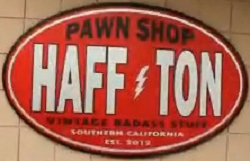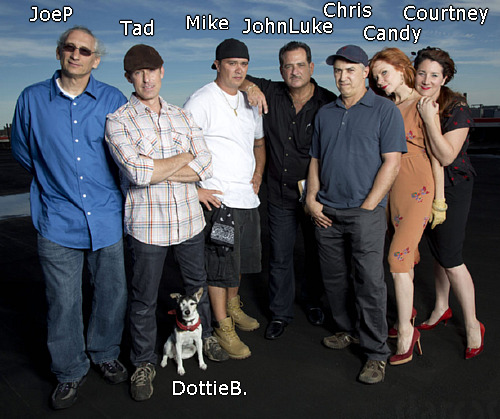 We sent out a press release on April 10th, 2013 officially announcing Virtual Storage Auction (Now OnlineStorageAuctions.com) to the public. The press release was well received by news agencies across the country. NBC, CBS, ABC & Fox news all picked up the article. This is just the beginning of a major marketing campaign designed to get the word out and drive more traffic to the site. Here is a link to the release:
We sent out a press release on April 10th, 2013 officially announcing Virtual Storage Auction (Now OnlineStorageAuctions.com) to the public. The press release was well received by news agencies across the country. NBC, CBS, ABC & Fox news all picked up the article. This is just the beginning of a major marketing campaign designed to get the word out and drive more traffic to the site. Here is a link to the release:
Author - T.C. Lane
Dave Hester from Storage Wars slapped a lawsuit against A&E that spawned a controversy. Dave claimed producers of the show “salt” the units with unique items to enhance the entertainment value of the show.
Layman terms – Dave claims the show is fake.
If Storage Wars’ lockers were and are salted by producers, then the spinoffs: Storage Wars: New York and Storage Wars: Texas may also be fabricated reality entertainment.
One of the most controversial reality series pertaining to storage units auctions is Auction Hunters: Pawn Shop Edition. At the start of each episode you read this intro:
“Each year Allen Haff and Ton Jones dig through hundreds of unclaimed storage units hunting for discarded treasures. These are the stories of their most rare and valued discoveries.”
The series suggest each episode is a reenactment of actual true life events. How does the pawn shop come into play?
On both their IMdb credit, neither Allen nor Ton were mentioned as “partners” in their bios.
The series however insinuates the Haff-Ton team have been partners for a long time when in all probability they first met on Auction Hunters in 2010.
Employees at the pawn shop are also actors:
- Big Sis – True identity unknown
- Lalo Fuentes Elle – actress Laura Soares and yes, she’s Brazilian
- Flula Borg – that’s his real name, he’s German and he is a musician
Check out Laura Soares’s IMdb page.
Check out Flula Borg’s Facebook page.
Reality TV defined as supposedly populated by real people, but even Allen Haff and Ton Jones are actors.
Who owns the pawn shop? Does it even exist for consumers to pawn and or to sell items? Begs the questions, “Is Auction Hunters: Pawn Shop Edition fake or is it reality TV scripted and staged for entertainment?”
It is yet unresolved if the producers of Storage Wars salt the units. However, it’s very probable (though there’s no proof either way) that neither Allen Haff or Ton Jones own a pawn shop. So how can something that isn’t real be reenacted as a real life story?
History Channel’s Pawn Stars contains historical facts. Storage Wars bubbles with tension among the bidders. Is it fair to speculate that Spike TV capitalized on the success of the two series by creating Auction Hunters: Pawn Shop Edition?
Is Amazing Race staged? No. They win Emmy Awards. Is Top Chef staged? No, they won an Emmy as well. Is any part of Auction Hunters real or is it a fake, staged and scripted reality TV entertainment show?
So, what do you think of Auction Hunters: Pawn Shop Edition?
Leave you interesting and creative responses below.
 Storage Wars: Season 3, Episode 29: “Nobody’s Vault But Mine.”
Storage Wars: Season 3, Episode 29: “Nobody’s Vault But Mine.”
Oh, 100-vaults up for auction, take one down, pass it around, 99-vaults up for auction today. Expectations high.
Maybe someone would find a lost Picasso sketch or painting. Or a carefully preserved 1800s chair or table. Or vintage jewelry from Tiffany.
Uh, no.
Most valued item shown in this episode was smaller than a breadbox. Guess who would be that lucky. I’ll get back to that.
Vault auctions differ than storage auctions. Vault sold as a single unit or as a “lot.” If you buy a lot, you bid on the purchase of one vault times the total number of vaults in that lot. For example, two vaults may make a lot. You bid $50 and win. That’s $50 x 2 vaults = $100. Reckless bidders, beware of vault auctions.
Players included Jarrod, Brandi, Barry, Ivy, Darrell, Brandon, and two new bidders – Herb and Mike. Also present was the late Mark Balelo who passed away in February.
Brandon sick as a dog. Once out of the car, H-U-R-L in the bushes. Poor sap. He stayed behind which left Darrell solo at the auction.
First Lot: 2-Vaults
Boxes marked office, clothes, books, and an old Singer sewing machine in view. Ivy talked a big game but Barry had deeper pockets. Won the vault for $375 x 2 = $750.
Second Lot: 2-Vaults
Glassware, clothing, and a hodgepodge of unappealing materials. Quick buy for new bidders Herb and Mike at $200 x 2 = $400.
Third lot: 10-Vaults
Time for the sharks to show their teeth. Herb and Mike the guppies were out. In the end it was Darrell against Mark who flashed his man purse full of cash. Feeding frenzy. Mark with bigger and whiter teeth won the vault for $150 x 10 = $1,500.
Who got lucky?
I’ll get to that.
Let’s start with the noobs Herb and Mike who float at the bottom of the food chain. Dug through the two vaults and found a washer and dryer, HDTV (older model), glassware, and household items. Oooh. Aahh. Tiaras carefully wrapped but we know they’re not real diamonds.
Herb and Mike took the tiaras to Haley, a beauty queen to have them appraised. You have got to be kidding me! She’s only nine-years-old. That’s your expert? Ugh. The items were crowns, not tiaras and she appraised the lot at around $550. Take that with a grain of salt.
Who got lucky? It wasn’t Mark. He bought ten vaults. Good furniture, bad furniture, mountain of clothes, carpet cleaner, bike, old television, computer, but was he happy. By the end of the show he had lost it.
Mark dug through a box. Found a cup. Threw it on the floor. Crash. “Opa!” He danced. Then he grabbed another item. Crash. “Opa!” Dance. Repeat. He went nuts. Mark lost money and lots of it.
Who found items of real value? You guessed it. Barry Weiss, “The Collector.” He found three silver trinkets inside a drawer of that old Singer sewing machine. Had the items appraised at an antique shop.
Expert stated that two of the silver trinkets were vinaigrettes. Women back in the 1800s would put a little vinegar mixed with lavender inside the trinket. If she came across a foul smell, she’d take a whiff of the vinaigrett (not a bad idea for present-day living). Last item was an egg-shaped pomander made around 1700s and extremely rare.
First two items appraised around $450-$800. Last item appraised near $1,000. Again, how does Barry walk away from two full vaults, leave with a small item, and still take a big bite of profit?
Profit Scorecard:
Barry Weiss: $2,200
Herb Brown & Mike Karlinger: $790
Mark Bolelo: LOSS-$700
What’s left to say about the episode — “Opa!”
Please leave your insightful opinions in the comment box below.
Positive feedback is an important aspect in developing a positive reputation.
OnlineStorageAuctions.com’s feedback technique allows members to create their own system of quality control.
In order to ensure that the feedback system works as intended, there are certain rules that all participants must adhere to.
All feedback must be given honestly and as a direct result of genuine sales interactions through this site.
Your participation on this site means that you agree to the following terms and conditions.
Feedback Manipulation
Users shall not attempt to manipulate the feedback system in such a way that their reputation could be inflated artificially. Further, users many not abuse the feedback system to artificially drop the reputation score of competitors.
This includes but is not limited to the following behaviors:
- Offering to sell, barter or give away feedback.
- Lowering a seller’s feedback score through repeated purchases and poor feedback.
- Paying or bartering other members for their accounts.
- Registering multiple accounts in an attempt to increase your own feedback score.
Feedback Extortion
- Buyers cannot use the threat of negative feedback as a way to coerce sellers into providing discounts, additional goods or unwarranted refunds.
- Sellers also cannot coerce buyers into leaving positive feedback as a condition of receiving the purchased goods.
Additionally, sellers cannot offer discounts, refunds, monetary compensation or additional items in exchange for positive feedback. This will be considered the same as purchasing feedback and is a breach of these terms and conditions.
 Storage auction rules and laws vary by state, by storage facility, and by auctioneer. Please consult with a professional in your area before relying on the following information.
Storage auction rules and laws vary by state, by storage facility, and by auctioneer. Please consult with a professional in your area before relying on the following information.
The official rules will usually be provided in the storage facility’s description. It is the buyer’s obligation to familiarize themselves with federal, state and local laws relating to the purchase, transportation and possession of their merchandise.
- Bidder registration. Before you can bid, you’ll need to register with OnlineStorageAuctions.com. There is no fee to register. Please provide your name, address, e-mail address and phone number. Your information is kept private and will only be seen by our staff and the seller. Once registered, you are free to buy and sell. If you choose to sell, your contact information will be made available to the winning bidder.
- Payment. If you win a storage unit, please contact the storage facility as soon as possible. Full payment must be made at the storage facility within the time specified in the auction description. If no time is specified, please make payment within 48 hours. If you fail to make payment, the seller reserves the right to cancel your bid and sell the unit to the next highest bidder.
If you win a unit being sold by a storage facility, please note you will be required to pay the bid amount, sales tax (unless exempt), and the security deposit. Unlike our competitors, we do not charge any additional fees. Our site is completely free for buyers and sellers. Cash is the primary method of payment, although some storage facilities do accept debit and credit cards. Please contact the storage facility (in advance) regarding their preferred method of payment. Checks are not accepted.
Failure to pay within the specified time frame could result in your IP address being blocked where you can no longer use OnlineStorageAuctions.com.
Some storage facilities will have an online and in-person auction on the same day. The online auction will usually end one hour before the in-person auction begins. At the live auction, the bidding will start at the amount of the highest online bid. If no one at the in-person auction bids, the online bidder wins the unit. The storage facility will then contact the winning bidder to make payment arrangements.
- Sales tax. Must be paid unless no tax is due. If you have a lawful exemption, a valid resale tax number; the unit is located in a state that doesn’t have sales tax or if you are purchasing a vehicle, trailer, recreational vehicle or boat; sales tax will not be charged. If you are tax exempt the storage facility will need to make a copy of your resale tax permit and will have you fill out a tax exempt form. All other buyers must pay sales tax on the amount of each winning bid. Once they accept your payment, you will be issued a receipt by the storage facility.
- Announcements. Made the day of the sale, prior to or during the online or in-person sale, which will then supersede any other announcement or advertising. OnlineStorageAuctions.com, storage facilities, private sellers, and auctioneers reserve the right to reject any bid, place a minimum bid, remove items from the sale, revoke bidding privileges, or cancel the sale completely.
- Age minimum. Buyers must be over the age of 18 to bid.
- All items are sold – “As Is.” Please examine the photos of the storage unit and read the seller’s description thoroughly before placing a bid. Once you have placed a bid, you have entered into a binding contract with the seller in which you agree to purchase the unit if you are the highest bidder. All storage units are sold “as is” and without warranties, representations or guarantees. All sales are final. If, during inspection of your purchase, you determine that the unit was blatantly misrepresented, or that items seen in the photos have been removed from the unit, you may refuse payment.
- Cleaning out the unit. Most storage facilities allow you 24-48 hours to remove all of the contents and sweep the unit clean. Every now and then, you will come across a facility that requires the winning bidder to remove the contents on the same day, although this is rare. The seller will notify you of how much time you have to clean out the unit in the auction listing. If you need additional time, most storage facility managers are willing to work with you as long as you keep them informed. You also have the option of renting the unit, which allows you to take your time. If you fail to clean out a unit, it can have severe consequences like losing your security deposit, receiving negative feedback or being banned from future auctions at that storage facility.
The storage facility’s dumpster may not be used by buyers without the permission of the facility manager.
If you purchase a unit from a private seller, you will need to coordinate a time to meet at the storage facility in order to clean out the unit or transfer the unit into your name. When meeting a private seller, please be cautious. We recommend that you bring someone along with you and that you only meet during the storage facility’s business hours.
- Cleaning deposit. Most storage facilities require you to pay a cleaning deposit on every unit you purchase. These deposits usually range from $20-100 and are fully refundable if the unit is cleaned properly within the designated time. The purpose of the cleaning deposit is to prevent people from purchasing a unit, removing all of the valuables, then leaving the unwanted items and trash behind.
Once you are finished cleaning out the unit, please stop by the rental office and let the employee on duty know. The employee will inspect the unit to verify that all of the contents have been removed and that it has been swept out. If the unit was cleaned properly, the employee will return your security deposit.
- Personal items. Please leave any personal items with the property manager so they can return them to the tenant. These items would include photographs, identification, tax and legal documents, birth, death and marriage certificates, diplomas, passports, and items with sentimental value.
- Leave Feedback. Be sure to leave accurate feedback on every transaction. Doing so will help our community be safer and more productive for everyone.
 Despite the recent controversy surrounding storage auction reality shows, Auction Hunters is still going strong.
Despite the recent controversy surrounding storage auction reality shows, Auction Hunters is still going strong.
On January 30th, Spike is renewing its popular reality show for a fourth season. Auction Hunters: Pawn Shop Edition follows Allen and Ton as they search through storage auctions and convert their finds to sales stock for their new pawn shop, Haff-Ton.
Running this pawn shop should be a challenge considering how much traveling they do to hunt through auctions, but they’ll undoubtedly find a way to make it work.
Haff-Ton Pawn Shop is located at 142 Culver Blvd. Playa del Rey, CA. 90293
In order to run the shop while the boys are out prospecting auctions, the Auction Hunters team has added a new staff member. Known as “Big Sis,” this woman has been buying and selling vintage goods for her whole life according to the Spike’s website. There isn’t much information available about “Big Sis,” including her real name; the newest season of Auction Hunters hasn’t been added to IMDB and there is no bio for this new cast member on the site.
All the same, she does get a brief cameo appearance in the show’s promotional trailer. Refreshingly, she is not a thin, blonde waif, and her character’s addition doesn’t seem geared toward generating sex appeal. All the same, only time will tell what she’ll bring to the table and whether this foray into pawn shop ownership will be a good fit for the show.
So, what do you think about Auction Hunters: Pawn Shop Edition ? Leave your interesting and creative responses in the comments section below.
 TruTV’s newest auction show, Container Wars, offers a fresh new look at the auction and resale industry.
TruTV’s newest auction show, Container Wars, offers a fresh new look at the auction and resale industry.
Rather than focusing on the now well-known business of storage unit auctions, Container Wars focuses on the relatively unheard of industry of shipping containers.
This cargo containers auction show follows several buyers as they examine and purchase the contents of unclaimed commercial shipping containers at an international port.
Watching the show makes it clear that the primary purpose of the program is entertainment. As the shipping containers tend to have high quantities of commercial goods, they are worth more than a standard storage unit.
This raises the stakes and makes every auction more exciting as high quantities of cash start to exchange hands.
Although the concept may seem far-fetched, cargo container auctions really do occur outside of television. Shipping containers are used to import goods from overseas.
They’re most commonly used by businesses that must bring in merchandise or materials from other countries. Some individuals may also use shipping containers in order to facilitate an overseas move.
Either way, the goods are loaded into massive cargo containers and placed on ships, which then sail to their destination and unload their cargoes into ports.
Once at the port, the cargo containers must be picked up. At this point, the buyer is responsible for paying any taxes or other fees associated with importing goods.
If you’ve ever shipped an item internationally, you know how pricy the duties and taxes can be. This leads to some buyers leaving their cargo in the port rather than picking it up.
These abandoned shipping containers are then moved into storage for a few months to ensure that no one is coming for them; then they are sold at auction to recover the shipping and storage costs.
Unlike storage units, which are usually filled with regular household items, shipping containers can hold nearly anything and everything you can imagine.
This makes the chance of a tidy profit much more likely, but it also makes these auctions somewhat less practical for the hobbyist. In reality, these container auctions are often not widely advertised, and they may occur within a small group of people who are well-known in other types of auction settings.
As always, networking with fellow auction hunters is a great way to find new leads on sales.
If you’re looking for a new niche to break into with your resale business, this cargo containers auction show can help inspire you. If you live near a shipping port, you might be able to engage in these auctions whenever they come up.
Even if storage unit auctions in your area are still saturated with newbies, shipping container auctions may remain relatively untouched. The fact that few people know about them combined with their higher cost may help to drive away newbies.
Please leave your insightful opinions in the comment box below.
 eBay is one of the most powerful tools in a resale business’s arsenal.
eBay is one of the most powerful tools in a resale business’s arsenal.
The auction site allows sellers to find collectors and other willing buyers for nearly any type of merchandise.
You can buy and sell items without the high overhead costs of maintaining a store-front, and you can connect with buyers from across the globe.
Every transaction you make on the site helps to build your business by affecting your reputation on the site. Because eBay rewards its best sellers, it’s in a merchant’s best interests to focus on ways to earn these rewards.
Approximately 4% of eBay’s merchants are considered Power Sellers and achieving that status can earn you substantial rewards:
- Shipping discounts for UPS and USPS
- Unpaid item protection
- Newsletters and access to Power Seller discussion boards
- Health insurance opportunities
- The ability to participate in research and promotional offers
- Phone consultations with eBay staff for support in becoming a Top Seller
Power Sellers carry a certain amount of prestige and earning. Maintaining this status is an important milestone toward becoming a high-earner on eBay. It does take some time to become a Power Seller, but with some effort you can earn that status after only 3 months.
First, be sure you are familiar with eBay’s rules as they are subject to change. Currently, Power Sellers must reach the following criteria:
- Be an active member for 3 months
- Make a minimum of $1,000 per month in sales for 3 consecutive months
- Have an overall feedback rating of 100% with a 98% positive or higher rank
- Follow all eBay rules and community values
Once you’ve reached Power Seller status, you can move up in tiers.
These tiers are determined by the amount of sales you make and the higher tiers translate to better rewards.
- Bronze must maintain $1,000 in sales per month.
- Silver must maintain $3,000 in sales per month
- Gold must maintain $10,000 in sales per month
- Platinum must maintain $25,000 in sales per month
- Titanium must maintain $150,000 in sales per month
Gold members have access to all of the standard Power Seller benefits plus access to eBay’s account manager software.
The secret to becoming a Power Seller is to maintain high sales and a level of professionalism.
Here are a few tips:
- Maintain good customer relations to improve your feedback ratings. Offer discounts or refunds when necessary, and keep communications open for your customers. It’s often worthwhile to lose some money in order to keep the customer happy rather than save the money and risk losing your rating.
- Keep a tight focus for your store. The best-rated eBay stores are often those that adhere closely to a specific type of merchandise. This makes it easier to maintain your listings and stay organized.
- Create professional listings and learn to take high-quality photographs. The quality of your photographs and descriptions will make a substantial difference in the amount of sales you make and will affect your customer ratings.
- Learn to use keywords to maximize the effect of your listing’s headline and description. This will help you show up in eBay and Google searches and improve your sales. Also be sure to run your auctions during prime sales times, such as weekends and evenings.
- Make it easy for customers to pay you. Accept international bids and multiple types of payment options. The more options you offer, the better your odds of securing a sale.
The tips on how to become an eBay Power Seller is simply to treat your eBay business seriously and focus on providing a positive customer experience while maximizing sales.
eBay automatically sends invitations to qualifying members each month, and participation in the program is free. As long as you continue to meet your sales goals along with good customer ratings; you will have constant access to the Power Seller benefits.
Please leave your insightful thoughts in the comment box below.
The Storage Wars formula is undoubtedly successful. After the first program premiered in 2010, fans started eagerly tuning in to see the antics of auction hunters in southern California. A&E then released another wildly popular show, Storage Wars: Texas, which takes place in Dallas. Now, following on the ever-growing success of the first two shows, A&E has decided to launch another installment in the popular franchise – Storage Wars: New York.
The show will follow the same premise of the others: Professional storage auction buyers will seek treasures at New York storage facilities. Part of the success of any reality TV show is the quality of its characters, and that’s certainly been true of other Storage Wars iterations in the past. Now that the show is cast, here’s what information we could dig up on these new faces.
Storage Wars New York Cast
Joe “P” Pauletich
A Queens native and 20-year veteran of the auction industry, Joe is what A&E describes as the “Philosopher King and Zen Master of Storage Facilities.” He’s bringing years of experience, patience and quiet-spoken wisdom to the table, and he’s a formidable opponent. Joe is the owner of SoHo Treasures, an antique store stocked with items from storage auctions, estate sales, and other sources.
Since the shop focuses primarily on upscale items, quirky vintage furniture, antiques and sculptures, it seems clear that Joe’s bidding strategy will be keeping a keen eye for the few items his shop needs.
The store’s website is located at SohoTreasures.com. The already well-known New York business is sure to get an influx of attention from shoppers now thanks to the show.
Candy Olsen and Courtney Wagner
Every storage auction TV reality series needs a pair of attractive young greenhorns, and Candy and Courtney fulfill that role. Luckily, these ladies have more than sunny personalities on their side. They’re also the owners of C&C Pop-up Shop, a roaming mobile store that sells vintage and up-cycled clothing and crafts. Working with a smaller budget than some of the other veterans on the show, Candy and Courtney will need to show careful strategy when placing bids.
Young and web-savvy, these girls already have some web presence. You can check in with them on Facebook, Pinterest, Twitter, Instagram, and Tumblr. For a mobile business, word-of-mouth is key, and this show will definitely help increase sells.
Mike Braiotta
If Joe Pauletich is the old veteran, Mike is the sharp, no-nonsense young businessman. Unlike other cast members who focus on up-scale vintage items, Mike’s got his eye on things of a more practical nature. His shop, Sam’s Seconds, is a consignment store that caters to normal buyers and sellers. Through keeping prices reasonable, he can sell a wider variety of goods – which makes it easier to turn a profit on any serviceable items found in a storage locker.
According to A&E, Mike’s both confident and not shy about “busting other people’s chops.” This will certainly add some drama to the show, and it helps him stand out alongside some of the quieter cast members. You can follow Mike on Twitter, where his username gives a good glimpse into his confident character – @nystorageking. Or, if you want to chat live with Mike from Storage Wars New York, he’s a regular on our OnlineStorageAuction.com forum.
Chris Morelli and Tad Eaton
It’s not Storage Wars without a bickering duo of savvy business partners, and Chris and Tad certainly fit the bill. Co-owners of The Frayed Knot, a furniture store specializing in antiques and vintage pieces, these two have plenty of experience in spotting a good deal and refurbishing gems in the rough. They started their business by refurbishing and re-selling items bought on Craigslist – a business that came easy to Chris, who had previously spent 17 years in the textile design industry.
Energetic Chris says whatever is on his mind, and it’s up to more down-to-earth Tad to keep him in line. They’re sure to become viewer favorites thanks to the quick interplay of sarcastic remarks. You can visit their store online at TheFrayedKnotOnline.com.
John Luke
An auction is only as good as its auctioneer, and John Luke is one of the best in the business. A 20-year veteran in the industry, John is New York personified. Friendly but fast-talking and businesslike, he knows the storage business inside and out and is more than happy to serve as an unofficial tour guide to the auction industry in the Big Apple.
It’s harder to find more information on John online than some of his colleagues, so fans are in for a bit of a surprise at the show’s premier as we get to know this friendly professional.
If Storage Wars: New York follows the same format as its predecessors, the cast should offer a fun mix of personalities. Colorful characters are the cornerstone of reality TV, and it’s certainly a powerful element of what’s made the Storage Wars franchise so successful.
Storage Wars: New York premieres on January 1st with two episodes. The first takes place in Brooklyn, and the second in Harlem.
So what do you think about the show? Leave your interesting and creative responses in the comments section below.
 Despite the name, “reality TV” often bears little resemblance to reality. After all, a show needs to be exciting enough to hook viewers and keep them coming back again and again.
Despite the name, “reality TV” often bears little resemblance to reality. After all, a show needs to be exciting enough to hook viewers and keep them coming back again and again.
The secret to creating a perfect reality TV show is to balance realism with melodrama in a way that will be engaging to viewers. It should be no surprise, then, to realize that many aspects of storage auction television are faked or played up for the cameras.
Spike’s popular show Auction Hunters frequently comes under fire from viewers who believe the show offers a misleading view of the auction industry. Several complaints are made:
- Ton and Allen travel all over the country searching for auctions, which is hardly a cost-effective strategy for real-world auction-hunters.
- The overwhelming majority of their finds are positive or earn a profit.
- They always know about the items that they find, and they manage to either be experts on a specific item or know an expert.
- They seem to always have buyers lined up for the items they win, even if those items occupy a very specific niche.
These same complaints can be made of other auction shows, of course, but Auction Hunters seems to paint an especially rosy picture of the auction hunting lifestyle.
The show does open with a disclaimer that the program shows only the best finds, but it’s hard to keep that disclaimer in mind when episode after episode shows the auction-hunters finding rare antiques, valuable artwork, expensive vehicles and other attractive finds.
Other programs, like Storage Wars, show the bidders losing money on bad units more often, which lends to the realism of the show. By choosing to cut out these segments, Auction Hunters presents a less realistic glimpse into the lives of storage unit buyers.
Staff members of Auction Hunters and other similar programs, in addition to bidders, auctioneers and others involved in the show, are required to sign nondisclosure agreements. This means that it’s hard to know for sure exactly what’s going on behind the scenes at an auction.
It’s likely that some or all of the following occur at least some of the time at every show:
- A lot of footage is filmed, but it’s cut down to show only the most positive aspects of the event.
- Rare or interesting items are placed into the unit after it’s been purchased. This is referred to as “salting,” and it allows film crews to get lots of usable footage of attractive-looking units even if the auction itself didn’t go well.
- The unit is pre-loaded with items by the show’s staff, and bidding is faked.
- The show is scripted and everything is determined in advance by the writers.
The final product of any reality TV show is probably a combination of these strategies with some unscripted events thrown in for flavor. It’s impossible to know for sure, thanks to the nondisclosure agreement signed by participants, but assuming that these programs are staged does help explain many of the most troubling elements of the programs.
There’s nothing inherently wrong with playing up the exciting elements of a program to help gain ratings, but it does have a very real negative impact on the industry.
Viewers, not realizing that the shows do not necessarily represent reality, may flock to auctions and bid substantially more than the units are worth. Believing that every unit might contain a rare treasure, novices overspend and drive up the costs for professionals.
This is bad news for everyone who tries to make a living from auction-hunting, and it’s one reason why researching the industry is so vital to people looking to get involved in the business. It’s possible to make a real living from storage unit auctions, but it can only happen if you’re educated about what you’re doing and avoid buying into the reality television hype from Auction Hunters and other similar programs.
Please leave your creative comments in the box below.






